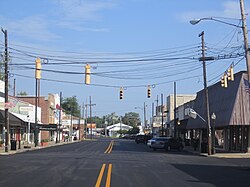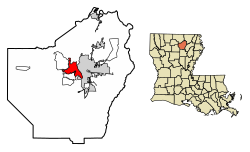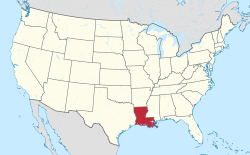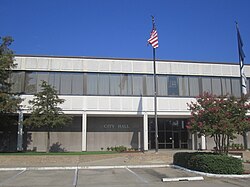West Monroe, Louisiana
 From Wikipedia - Reading time: 10 min
From Wikipedia - Reading time: 10 min
West Monroe, Louisiana | |
|---|---|
 Cottonport Historic District (2010) | |
 Location of West Monroe in Ouachita Parish, Louisiana. | |
 Location of Louisiana in the United States | |
| Coordinates: 32°30′05″N 92°08′31″W / 32.50139°N 92.14194°W | |
| Country | United States |
| State | Louisiana |
| Parish | Ouachita |
| Government | |
| • Mayor | Staci Albritton Mitchell[citation needed] |
| Area | |
• Total | 8.31 sq mi (21.53 km2) |
| • Land | 8.03 sq mi (20.79 km2) |
| • Water | 0.29 sq mi (0.74 km2) |
| Elevation | 82 ft (25 m) |
| Population (2020) | |
• Total | 13,103 |
| • Density | 1,632.57/sq mi (630.35/km2) |
| Time zone | UTC-6 (CST) |
| • Summer (DST) | UTC-5 (CDT) |
| Area code | 318 |
| FIPS code | 22-80955 |
| GNIS feature ID | 2405712[2] |
| Website | [1] |
West Monroe is the second largest city in Ouachita Parish, Louisiana, United States. As of the 2020 United States census, its population was 13,103. It is situated on the Ouachita River, across from the neighboring city of Monroe. The two cities are often referred to as the Twin Cities of northeast Louisiana.
History
[edit]Originally laid out in 1837 as Byron by John Campbell at the foot of the ferry landing to Monroe, the town floundered and Campbell went bankrupt. The area was bought by Christopher Dabbs, a doctor from Virginia who submitted the plans for Cotton Port in 1854; it was officially recognized in 1859.
It too languished until the arrival of the Vicksburg, Shreveport and Pacific Railway and the construction of the bridge over the Ouachita River. Cotton Port boomed as a river port and rail depot.[3]
Geography
[edit]According to the United States Census Bureau, the city has a total area of 8.0 square miles (20.6 km2), of which 7.7 square miles (20.0 km2) is land and 0.2 square mile (0.6 km2) (3.14%) is water.
West Monroe is a separate municipality from Monroe.
Demographics
[edit]| Census | Pop. | Note | %± |
|---|---|---|---|
| 1890 | 447 | — | |
| 1900 | 775 | 73.4% | |
| 1910 | 1,127 | 45.4% | |
| 1920 | 2,240 | 98.8% | |
| 1930 | 6,566 | 193.1% | |
| 1940 | 8,560 | 30.4% | |
| 1950 | 10,302 | 20.4% | |
| 1960 | 15,215 | 47.7% | |
| 1970 | 14,868 | −2.3% | |
| 1980 | 14,993 | 0.8% | |
| 1990 | 14,096 | −6.0% | |
| 2000 | 13,250 | −6.0% | |
| 2010 | 13,065 | −1.4% | |
| 2020 | 13,103 | 0.3% | |
| U.S. Decennial Census[4] | |||
| Race | Number | Percentage |
|---|---|---|
| White (non-Hispanic) | 7,082 | 54.05% |
| Black or African American (non-Hispanic) | 4,607 | 35.16% |
| Native American | 27 | 0.21% |
| Asian | 116 | 0.89% |
| Pacific Islander | 6 | 0.05% |
| Other/Mixed | 521 | 3.98% |
| Hispanic or Latino | 744 | 5.68% |
As of the 2020 United States census, there were 13,103 people, 5,616 households, and 2,636 families residing in the city.
West Monroe is part of the Monroe Metropolitan Statistical Area.
Government
[edit]
The current mayor is Staci Albritton Mitchell, who has served since 2018.
A 2013 "Community Impressions" report complimented the green spaces, including the Kiroli and Restoration parks, and Antique Alley as important assets to the West Monroe community. According to long-term Mayor Dave Norris, the study confirms "the value of many of the projects we've focused on to enhance quality of life."[6] The report identifies situations in need of improvement, many of which have already been addressed, including insufficient or inaccurate signage to area attractions, brown water and the need to renovate certain wells, limited shopping opportunities for clothing, traffic problems on Thomas Road, and the failure to promote the popular phenomenon created from the West Monroe-based A&E reality television series, Duck Dynasty.[6] The consultants declared West Monroe and the general area west of the Ouachita River overall as "a clean, vibrant, growing friendly area ... [with] a small town atmosphere and yet ... many of the amenities and features of a [larger] city."[6]
National Guard
[edit]1022nd Engineer Company (Vertical) of the 527th Engineer Battalion of the 225th Engineer Brigade is located in West Monroe.
Education
[edit]Ouachita Parish School System is the area school district.[7]
Media
[edit]Radio
[edit]West Monroe is the second most populous city of the Monroe media market for radio.
Television
[edit]West Monroe is part of the Monroe media market for television.
Notable people
[edit]- Donnie Copeland, Republican member of the Arkansas House of Representatives, 2015 to 2017[8]
- Clarence Faulk, publisher, broadcaster, businessman in Ruston, born in West Monroe in 1909
- William C. Feazel, oilman, interim U.S. Senator and member of the Louisiana House of Representatives
- Bruce Fowler, opera singer
- Andy Griggs, country singer
- Kevin Gordon, Americana singer/songwriter
- James D. Halsell, astronaut; space shuttle pilot
- Dixon Hearne, author
- Alton Hardy Howard, co-founder of Howard Brothers Discount Stores
- Bradie James, NFL linebacker for the Dallas Cowboys
- Rickey Minor, music director, composer and music producer
- William Norris III (1936-2016), city, district, and circuit court judge
- Webb Pierce, Country Music Hall of Fame member
- Cassidy Riley, professional wrestler for WWE
- Phil Robertson, Duck Dynasty star and founder of Duck Commander
- Kay Robertson, Duck Dynasty star
- Sadie Robertson, Duck Dynasty star
- Si Robertson, Duck Dynasty star
- Willie Robertson, Duck Dynasty star
- Jase Robertson, Duck Dynasty star
- Korie Robertson, Duck Dynasty star
- Bill Russell, professional basketball player
- Andrew Whitworth, NFL offensive tackle
References
[edit]- ^ "2020 U.S. Gazetteer Files". United States Census Bureau. Retrieved March 20, 2022.
- ^ a b U.S. Geological Survey Geographic Names Information System: West Monroe, Louisiana
- ^ "Antique Alley".
- ^ "Census of Population and Housing". Census.gov. Retrieved June 4, 2015.
- ^ "Explore Census Data". data.census.gov. Retrieved December 29, 2021.
- ^ a b c "Greg Hilburn, "Consultants: 'West Monroe clean, vibrant, growing'"". Monroe News-Star. Retrieved April 27, 2013.
- ^ "2020 CENSUS - SCHOOL DISTRICT REFERENCE MAP: Ouachita Parish, LA" (PDF). U.S. Census Bureau. pp. 12–13, 19 (PDF pp. 13-14, 20/31). Retrieved January 4, 2025. - Text list
- ^ "Donnie Copeland's Biography". Project Vote Smart. Retrieved April 18, 2016.
 KSF
KSF